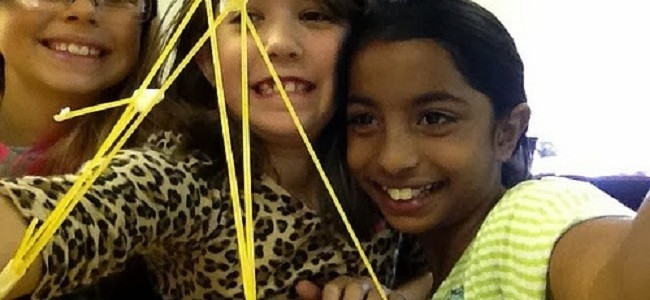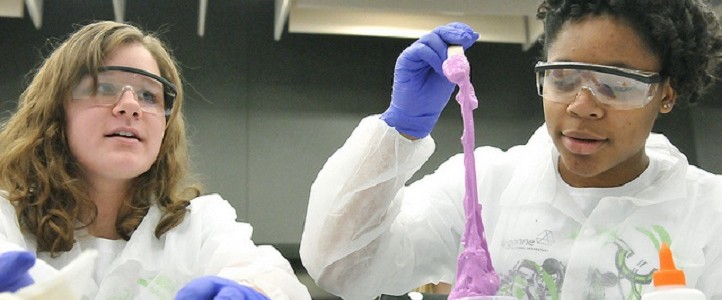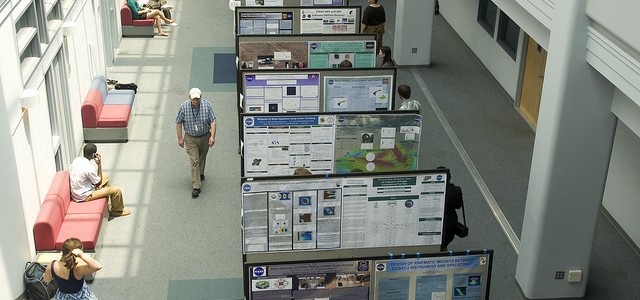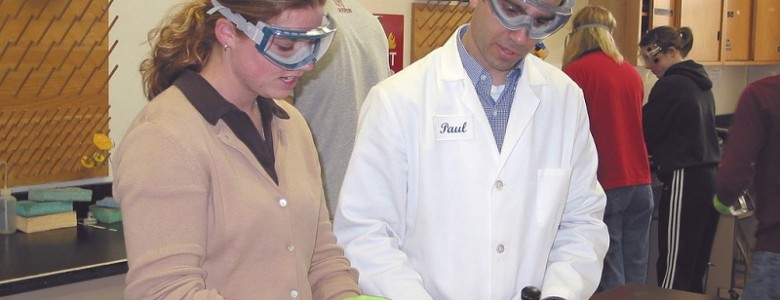 I hope many of you took time from gambling to attend the panel session, “Sticking with STEM: How the Academic Library Can Help to Retain Successful Students” at the ALA Annual Conference 2014 in Las Vegas. The program was co-sponsored by ACRL’s Science and Technology Section and Health Sciences Interest Group, and featured three speakers…. Read more »
I hope many of you took time from gambling to attend the panel session, “Sticking with STEM: How the Academic Library Can Help to Retain Successful Students” at the ALA Annual Conference 2014 in Las Vegas. The program was co-sponsored by ACRL’s Science and Technology Section and Health Sciences Interest Group, and featured three speakers…. Read more »
 I encourage librarians who are researching undergraduate STEM retention or developing retention strategies to reach out and share your findings and experiences beyond the library profession. An obvious audience for the library science perspective is the education profession, which can be reached through a number of publications. Journal of Research in Science Teaching, Journal of… Read more »
I encourage librarians who are researching undergraduate STEM retention or developing retention strategies to reach out and share your findings and experiences beyond the library profession. An obvious audience for the library science perspective is the education profession, which can be reached through a number of publications. Journal of Research in Science Teaching, Journal of… Read more »
 Last year, The Huffington Post started the HuffPost Girls in STEM Mentorship Program to match up more than 500 girls with mentors in science and engineering. The news publication has created the Girls in STEM webpage to chronicle the mentorship program and promote discussion on how to attract and keep girls in STEM. The webpage… Read more »
Last year, The Huffington Post started the HuffPost Girls in STEM Mentorship Program to match up more than 500 girls with mentors in science and engineering. The news publication has created the Girls in STEM webpage to chronicle the mentorship program and promote discussion on how to attract and keep girls in STEM. The webpage… Read more »
 The theme of ACRL’s Science and Technology Section (STS) Theme Poster Session at the ALA Annual Conference in Las Vegas this summer is: How can librarians assist with student diversity and retention in the STEM and health science fields at their institutions? The posters will be exhibited on Monday, June 30, 2014, from 10:30… Read more »
The theme of ACRL’s Science and Technology Section (STS) Theme Poster Session at the ALA Annual Conference in Las Vegas this summer is: How can librarians assist with student diversity and retention in the STEM and health science fields at their institutions? The posters will be exhibited on Monday, June 30, 2014, from 10:30… Read more »
 For those attending the American Library Association Conference this year, save Monday, June 30, 8:30 – 10 am to attend a panel session directly related to this blog. “Sticking with STEM: How the Academic Library Can Help to Retain Successful Students” is being sponsored by the Association of College and Research Libraries’ Science and Technology… Read more »
For those attending the American Library Association Conference this year, save Monday, June 30, 8:30 – 10 am to attend a panel session directly related to this blog. “Sticking with STEM: How the Academic Library Can Help to Retain Successful Students” is being sponsored by the Association of College and Research Libraries’ Science and Technology… Read more »
 In considering how academic librarians might increase retention among science undergraduates, it is important to remember the impact of community colleges on retention. Lloyd and Eckhardt reported in Science Educator that more than half of students receiving bachelor’s and master’s degrees in science in 2004 had attended community college at some point (p.33). Knowing the… Read more »
In considering how academic librarians might increase retention among science undergraduates, it is important to remember the impact of community colleges on retention. Lloyd and Eckhardt reported in Science Educator that more than half of students receiving bachelor’s and master’s degrees in science in 2004 had attended community college at some point (p.33). Knowing the… Read more »
 The Chronicle of Higher Education recently published a lengthy article entitled, “The STEM Crisis: Reality or Myth?” Various experts in science policy and labor trends contributed their views, and in the end, I was left wondering whether I should even continue this blog. But then I started reading a major study of STEM majors… Read more »
The Chronicle of Higher Education recently published a lengthy article entitled, “The STEM Crisis: Reality or Myth?” Various experts in science policy and labor trends contributed their views, and in the end, I was left wondering whether I should even continue this blog. But then I started reading a major study of STEM majors… Read more »
 Introductory biology courses are full of bright, enthusiastic students who want to be doctors someday. But when they get their first exams back with scores below 80, their dreams of medical school start to fade. The New York Times article, “Why Science Majors Change Their Minds (It’s Just So Darn Hard),” reports that 40% of… Read more »
Introductory biology courses are full of bright, enthusiastic students who want to be doctors someday. But when they get their first exams back with scores below 80, their dreams of medical school start to fade. The New York Times article, “Why Science Majors Change Their Minds (It’s Just So Darn Hard),” reports that 40% of… Read more »
 More specifically, how can U.S. academic libraries help retain undergraduates in the science majors? That’s the topic I’ll be exploring in this blog, and I hope you’ll join me in the undertaking. It’s widely known in U.S. higher education there are not enough science majors “in the pipeline” to meet the needs of an increasingly… Read more »
More specifically, how can U.S. academic libraries help retain undergraduates in the science majors? That’s the topic I’ll be exploring in this blog, and I hope you’ll join me in the undertaking. It’s widely known in U.S. higher education there are not enough science majors “in the pipeline” to meet the needs of an increasingly… Read more »
 I hope many of you took time from gambling to attend the panel session, “Sticking with STEM: How the Academic Library Can Help to Retain Successful Students” at the ALA Annual Conference 2014 in Las Vegas. The program was co-sponsored by ACRL’s Science and Technology Section and Health Sciences Interest Group, and featured three speakers…. Read more »
I hope many of you took time from gambling to attend the panel session, “Sticking with STEM: How the Academic Library Can Help to Retain Successful Students” at the ALA Annual Conference 2014 in Las Vegas. The program was co-sponsored by ACRL’s Science and Technology Section and Health Sciences Interest Group, and featured three speakers…. Read more »
 I hope many of you took time from gambling to attend the panel session, “Sticking with STEM: How the Academic Library Can Help to Retain Successful Students” at the ALA Annual Conference 2014 in Las Vegas. The program was co-sponsored by ACRL’s Science and Technology Section and Health Sciences Interest Group, and featured three speakers…. Read more »
I hope many of you took time from gambling to attend the panel session, “Sticking with STEM: How the Academic Library Can Help to Retain Successful Students” at the ALA Annual Conference 2014 in Las Vegas. The program was co-sponsored by ACRL’s Science and Technology Section and Health Sciences Interest Group, and featured three speakers…. Read more »


 I encourage librarians who are researching undergraduate STEM retention or developing retention strategies to reach out and share your findings and experiences beyond the library profession. An obvious audience for the library science perspective is the education profession, which can be reached through a number of publications. Journal of Research in Science Teaching, Journal of…
I encourage librarians who are researching undergraduate STEM retention or developing retention strategies to reach out and share your findings and experiences beyond the library profession. An obvious audience for the library science perspective is the education profession, which can be reached through a number of publications. Journal of Research in Science Teaching, Journal of…  Last year, The Huffington Post started the HuffPost Girls in STEM Mentorship Program to match up more than 500 girls with mentors in science and engineering. The news publication has created the Girls in STEM webpage to chronicle the mentorship program and promote discussion on how to attract and keep girls in STEM. The webpage…
Last year, The Huffington Post started the HuffPost Girls in STEM Mentorship Program to match up more than 500 girls with mentors in science and engineering. The news publication has created the Girls in STEM webpage to chronicle the mentorship program and promote discussion on how to attract and keep girls in STEM. The webpage…  The theme of ACRL’s Science and Technology Section (STS) Theme Poster Session at the ALA Annual Conference in Las Vegas this summer is: How can librarians assist with student diversity and retention in the STEM and health science fields at their institutions? The posters will be exhibited on Monday, June 30, 2014, from 10:30…
The theme of ACRL’s Science and Technology Section (STS) Theme Poster Session at the ALA Annual Conference in Las Vegas this summer is: How can librarians assist with student diversity and retention in the STEM and health science fields at their institutions? The posters will be exhibited on Monday, June 30, 2014, from 10:30…  For those attending the American Library Association Conference this year, save Monday, June 30, 8:30 – 10 am to attend a panel session directly related to this blog. “Sticking with STEM: How the Academic Library Can Help to Retain Successful Students” is being sponsored by the Association of College and Research Libraries’ Science and Technology…
For those attending the American Library Association Conference this year, save Monday, June 30, 8:30 – 10 am to attend a panel session directly related to this blog. “Sticking with STEM: How the Academic Library Can Help to Retain Successful Students” is being sponsored by the Association of College and Research Libraries’ Science and Technology…  In considering how academic librarians might increase retention among science undergraduates, it is important to remember the impact of community colleges on retention. Lloyd and Eckhardt reported in Science Educator that more than half of students receiving bachelor’s and master’s degrees in science in 2004 had attended community college at some point (p.33). Knowing the…
In considering how academic librarians might increase retention among science undergraduates, it is important to remember the impact of community colleges on retention. Lloyd and Eckhardt reported in Science Educator that more than half of students receiving bachelor’s and master’s degrees in science in 2004 had attended community college at some point (p.33). Knowing the…  The Chronicle of Higher Education recently published a lengthy article entitled, “The STEM Crisis: Reality or Myth?” Various experts in science policy and labor trends contributed their views, and in the end, I was left wondering whether I should even continue this blog. But then I started reading a major study of STEM majors…
The Chronicle of Higher Education recently published a lengthy article entitled, “The STEM Crisis: Reality or Myth?” Various experts in science policy and labor trends contributed their views, and in the end, I was left wondering whether I should even continue this blog. But then I started reading a major study of STEM majors…  Introductory biology courses are full of bright, enthusiastic students who want to be doctors someday. But when they get their first exams back with scores below 80, their dreams of medical school start to fade. The New York Times article, “Why Science Majors Change Their Minds (It’s Just So Darn Hard),” reports that 40% of…
Introductory biology courses are full of bright, enthusiastic students who want to be doctors someday. But when they get their first exams back with scores below 80, their dreams of medical school start to fade. The New York Times article, “Why Science Majors Change Their Minds (It’s Just So Darn Hard),” reports that 40% of…  More specifically, how can U.S. academic libraries help retain undergraduates in the science majors? That’s the topic I’ll be exploring in this blog, and I hope you’ll join me in the undertaking. It’s widely known in U.S. higher education there are not enough science majors “in the pipeline” to meet the needs of an increasingly…
More specifically, how can U.S. academic libraries help retain undergraduates in the science majors? That’s the topic I’ll be exploring in this blog, and I hope you’ll join me in the undertaking. It’s widely known in U.S. higher education there are not enough science majors “in the pipeline” to meet the needs of an increasingly… 